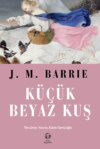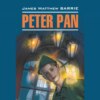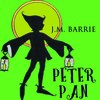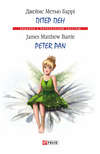Kitabı oku: «A Widow's Tale, and Other Stories», sayfa 30
JOHN
CHAPTER I
"Djohn, Djohn!" cried the boy, "come back: the mother is looking for you – something has happened. At once, at once, you must go home!"
"What has happened? Is she ill? Has she hurt herself? Has there been an accident?" demanded John, a tall lad of sixteen, dressed, like the first speaker, in country clothes of French cut, but with a certain difference which marked his different nationality.
"There has been an accident, but not to her. Make haste! It is very exciting. It is a gentleman that is hurt, and he is your father. Half the village is at the door. So go, quick, quick! I have run before them all to tell you."
"A gentleman who is my father! My father is dead years ago," said the elder boy, with a flush on his face.
"Nevertheless it is quite true what I say. Come quick, come quick! I am going back: something new may have happened even since I came away."
With that the little French villager rattled off on his noisy shoes, full of excitement, down the stony street towards the railway station, calling to some other youths, as he passed, also to come quick, for that something tremendous had happened chez l'Anglaise. That little group clattered after him, all agog in a moment with the precious thought of some distraction; for few things ever happened in these regions. But the person most concerned hung back. He had never been out of this village in his life – he knew no other mode of existence; yet when Jean called to John that his home was the scene of a mysterious catastrophe, John held back with a proud shame and horror which could not endure publicity. Perhaps his slowness of brain took a moment more to fathom the mere fact of a catastrophe; but in reality his heart was already beating loudly in his breast, and his head beginning to buzz and swell, while still he kept up the fiction of walking deliberately and yielding to no excitement. What was it that had happened? Nothing had happened in all John's life but what happened every day. He had been born and lived always in that little town of Cagnes. He was the son of l'Anglaise, and, as a matter of fact, though he had been brought up just like them, he was not the same as the other boys. There was something in him different: he was slower than they were, more deliberate, more calm. He did not quarrel as they did, noisily, with shrieks, and sometimes tears; but he was more dangerous than the rest when his composure was really disturbed. His mother was a very shrinking, quiet woman, who lived in a small house with a big garden on the lower slope of the hill. She was one who said little to anybody, even to her son whom she adored; but she was a very useful person in her quiet way, and though she was English, and silent, and a stranger, was rather popular than otherwise in Cagnes. Everybody knew l'Anglaise, who was a feature in the small community, not like anybody else. People who knew her well called her Madame Jeanne. She had arrived there quite by accident in the first grief of her widowhood, with a pathetic story, as was commonly told and reported. She had gone to meet her husband, a sailor, at Marseilles; but instead of finding him had received the news of his death – and being very lonely, had strayed on distracted until she saw the little town of Cagnes rising upon its hill above the prosaic line of the railway, and all the green and lovely country round. She had stopped there at hazard, in the sickness of her heart; and there her son had been born, and she had lived ever since. I am not aware that any one had heard this story from her own lips. Certainly John had never heard it; but he understood somehow, as everybody else did in Cagnes, that this was his mother's story. So many things there are in the world which have come into the common mind somehow, exist by some vitality of their own, and do not need to be re-told. John would have gone to the stake for it, and so would half the population of Cagnes, that his father was a sailor and died before he was born. What, then, did this ridiculous little Jean, Jean au Meunier, the miller's son, mean by his ridiculous story? John would not follow down the steep and stony street, where every step made such a noise on the flags, as if he were moved by that absurd tale. But presently he dived down one of the side lanes which led down the slope of the hill, almost perpendicularly between two lines of houses, until you came to the broken slopes farther down, where you could zigzag your way among the prickly aloe bushes, and the terraces of the olive gardens. His mother's cottage lay at the foot of the hill, with its large, sloping, sunny garden, in which the trees in blossom, peach and apple, stood out against the grey background of the olives, and the last of the winter oranges made a show for more than they were worth upon the darker green of the trees. John's heart beat very loud indeed as he tumbled down these steps, slipping and springing in his haste; but he was half-disappointed, half-relieved, to find no crowd, no commotion about the house. The door was locked as usual, and the key hid under the great white bank of marguerites, as it always was when his mother had gone out. There was not a sign about of anything but the ordinary calm.
Some one, however, called to him from the road, as he stood, not knowing what to do next, in front of the gate.
"Hé, le Djohn!" cried this passer-by, "thy mother is not here. You will find her at the Hôtel de la Gare, with the gentleman who is dying, or like to die."
"What gentleman?" cried John, striding over the broken ground towards the speaker.
"Do I know? Some one who came in search of her and thee. It is thought thy real father. But why ask me? Go and see for thyself!"
John paused a little till this man had passed, disappearing into the valley. He would not allow a mere peasant, a clodhopper, to see the commotion in which his mind was; but as soon as the passer-by was out of sight he took to his heels and ran all the way, which was more than a mile, through the opening of the valley to the white Route Nationale which ran along the coast, on the other side of which was the little new station and a half-built house, emblazoned with the ambitious title of Hôtel de la Gare, in the meantime not much more than a café, where the Cagnois went on Sundays to drink their bocks and breathe the dust they love. Here, sure enough, there was a crowd at the door, and many signs of excitement – the men standing about and describing something to each other, two railway porters surrounded by the closest group, and the women all pressing up the steps, shaking their heads and asking questions of the proprietor, who stood blocking up the doorway. John had run as only a boy can all the way until he came in sight of this little throng; then he altered his aspect, slowed down by degrees, thrust his hands into his pockets, and came the rest of the way in slow marching time, as if he were going along for his proper diversion, and had nothing on his mind. There was a great outcry, however, before he reached the spot, and he saw his mother led out into the balcony and placed there in a chair, apparently fainting, one woman sprinkling water upon her head, another fanning her, two or three hanging about wringing their hands. When John saw this he made a sudden forward movement, and forced his way through the crowd, which, as soon as it was seen who he was, gave way before him.
"It is her boy – let him go to her. Djohn, God bless thee! be good to thy poor mother. Let him go in, let him go in, Père Rondilet – it is her boy."
But, notwithstanding these encouragements and the readiness of everybody to help him, it was not so easy for John to attain to his mother. There were two rooms which opened upon that balcony, the doors of both of which were shut and guarded, one by a spare, trim, English-looking man, the other by one of the women who knew Madame Jeanne, and who now took John's head in her two hands, kissed him, leaving a tear on his cheek, and begged him to have patience a little.
"Thy mother has had a great shock," she said. "She has an attack of the nerves – how could it be otherwise after such a discovery? Wait a little till she comes to herself, my little friend." "Little friend" does not mean anything so soft and tender in English as mon petit ami did; but we must take the faults of our language along with its qualities.
"What does it mean?" cried John. "What lies are they all saying about my father? My father was dead before I was born."
"I beg pardon," said the English-looking man, in very slow and difficult French; "is this the English lady's son?"
John answered abruptly in English, perhaps even a little rudely. "Who are you?" He was very much irritated and troubled, poor boy. He divined a certain inferiority in the man, and the horrible question, Was this perhaps his father? crossed his mind.
"I am Mr Rothbury's servant – I may say his confidential man; and I know everything," was the strange reply.
The good woman who had just spoken to John stood open-mouthed with admiration to hear the boy whom she had known all her life thus express himself in a foreign tongue with an aplomb which was extraordinary, and which the strange gentleman quite a gentleman in the opinion of Mère Pointêt, understood and replied to with so much deference. Decidedly John, who had been brought up among them all, and considered just as one of the other boys, had more in him than anybody thought.
"What do you mean by everything?" said John. "And who is Mr Rothbury? I don't suppose there is anything to know."
"This is not a place to explain, if you are not acquainted with the circumstances, sir," the English valet said.
John was not at all accustomed to be spoken to in this tone; and though it was meant to be very respectful, it seemed to him something like mockery. He grew very red with the idea that he was being laughed at.
"Perhaps you mistake me for some one else," he said. "I can speak English because my mother is English – that is all; and I won't stand being made fun of, I can tell you. Though you are," he added after a moment with reluctant candour, "a great deal bigger than me."
"I am not making fun of you, sir. I am your father's valet; it wouldn't become me, especially with him, poor gentleman, lying dead on the other side of the door."
"Lying dead!"
A kind of horror seized upon John. He had never, that he knew of, been so near to any one who was dead. He drew back a step, with the timidity that is born of awe.
"Would you like to see him, sir?" the valet said.
"What does he say?" said the Mère Pointêt. "It is just: you ought to go and see him, you who belong to him. Thy mother is too much agitated – it would kill her to remain there; but thou, boy, go – it is only right, since the man is thy father, whatever he may have been in his life."
"I have no father – my father died long ago," the boy cried.
But presently, without wishing it, he found himself in the room which the valet unlocked to admit him. A man lay on the bed in his ordinary clothes – the clothes in which he had travelled. Nothing as yet had been done of those last offices which are performed for the dead. The windows which opened on the balcony were half-closed with shutters, but open enough to let the sounds without come in; the room was, if not "the worst inn's worst room," at all events the bare, newly-plastered, half-furnished room of a poor railway hotel. There were no curtains, no veil of any kind to conceal the terrible fact of that big figure lying there, in all the dreadful ordinariness of a tweed travelling suit, and boots upon which the dust of the road still lay.
"You must not think it was the shock alone," the valet said, moving on tiptoe, and speaking in a whisper. "It was a great shock, of course; but it happened yesterday. My master saw Mrs Rothbury standing on the platform at the station as the train went by. Shows how much he had thought of her, doesn't it, sir, that just a glimpse like that as we went by was enough, after all these years? To be sure, the train slowed as we went through the stations. I saw the lady too, and I believe it was you, sir, along with her; but then I had never seen my poor master's wife. And he didn't know anything about you, if you'll excuse me saying it. He would have come back here last night if he hadn't been taken so bad. He's been ill a long time, my poor master has – gout and many other things. But when he saw you, sir, there was no holding him. 'Struthers,' said he (my name is Struthers, sir) – 'there's a child, she's got a child – and a boy too: what I've always wished for was a boy.' The doctor had to let him come this morning, – he wouldn't be kept back; but he said to me, the doctor did, 'It's as much as his life is worth.' Family quarrels are dreadful things. I don't want to say a word against your mother, sir. She had her reasons, no doubt of it; but my poor master might have been a better man as well as a happier if – It's not for a servant to make remarks. Come a little nearer this way."
"I don't want to see him," said John, trembling. "I don't know who he is. I don't wish to hear anything more about him."
"He is your father, sir," said the valet, reproachfully; and John stood still with a strange fascination, yet repugnance, while the man withdrew the handkerchief which covered the face. The boy trembled from head to foot at the sight. It was a face in which there was little of the dignity and solemnity that so often comes even upon the homeliest faces when death has touched them – a large heavy countenance with bloated features, and eyes half-closed, with something of a stare in them under the light-coloured, scanty eyelashes. It was impossible to believe that the man was dead. The redness natural to it had hardly departed from the coarse face; a few limp locks of hair, laid over in life to hide the baldness, straggled now about the swollen temples – not a face to be remembered as that of a boy's father. John stumbled away, covering his face with his hands. What did it mean? His father? – but he had had no father since ever he was born.
Presently he was told that his mother was better – that she wanted him to take her home; but she did not say anything to him when he went into the next room where she was. She had her little black bonnet on, which always made so great a difference between her and the village women in their white caps, and which John had been unconsciously proud of, as a sign that she was not as they were, but an English lady such as he had read of in books. Her face was covered with a thick veil, and she took hold of his boyish arm with a sort of clutch, holding it against his, and almost resting her head upon his shoulder, for she was a little woman, and he was taller already than she was. In this way he led her through the crowd at the door, feeling the importance of it, even though he felt his heart turned from his mother in the shock of this discovery. She had deceived him in some dreadful way, he scarcely as yet knew how; but, at all events, he was her protector now, her defence against all these prying people. He held her up with his arm, and he made signs to them with his disengaged hand not to press upon her, not to speak to her. He was her protector, that was certain, – even though he might be angry with her, it was his business to take care of her, and not that of any other person in the world. They went along together, she always holding fast by his arm, her head bowed, her face hidden by her veil, along the white line of the Route Nationale, where scattered groups stood about every house, though thinning as they went on, and stared at her and him – until they turned into the valley road and the slopes of broken ground, beyond which the cottage lay. It was only when they were there, and no one within sight or hearing, that she spoke.
"Oh, John, you are angry with me," she said.
"How can I be angry with you? But you have deceived me, mother," said the boy.
"I have never deceived you – nor any one. All that – that was said of me, that I suppose you have heard – was not from me, John. I said nothing at all. I meant always when you were older to tell you, but I never thought you seemed to care."
"Not care!" he said.
He could not have told her even now the pang which was hot in his heart for the loss of his sailor father, the young father of whom he had dreamed so often, who had been coming home so joyfully to his wife and child, and whom death had seized in the middle of his happiness. He had thought of him so often, imaging him forth to himself, that it almost seemed to John as if he could have painted a picture of the young man sweeping the horizon to be the first to see land – that land which he was never to see. He meant to paint a picture of it one day, which should move every heart. He had almost heard the swish of the waves along the vessel's side, the sound of the wind in the sails, and seen the wistful look in that face, – which now he was to learn had never existed, never looked out for land, never borne that disappointment which had wrung his son's heart for him so many, many times. It was with a visionary anguish that the boy realised all this. "Not care!" What was there that he had cared for more? Scarcely even this mother, bowed down with trouble, who clung to his arm. The mother, though he loved her, was still a mortal and fallible: little questions rose between them: she came to decisions which were not always just according to John's way of thinking, and said things that jarred upon him. But the father was beyond all that. He was the true ideal, without fault, full of unknown treasures of tenderness and wisdom. It would have astonished that mother beyond measure, she who thought she knew her son so well and possessed all his affection, to know how much closer still that vision was to John's heart.
"You never said a word," she cried now, with a vague pang; "you never asked a question. How was I to know? But I meant always to tell you when you should be older. Oh, John! I know now that I was very rash and imprudent; but then I did not think of that, I was so young, and life was very hard upon me. I was disposed of just as they pleased. I was more unhappy than any one can ever know. And I have never regretted it till now. I have lived a life of peace with my own child. I have been quite happy – I who was so wretched, John."
"I wish you would tell me how it all happened," he said, almost coldly.
He turned his head away from her. He gave her still the support of his arm – so much support as was in it, for it began to tremble in her close pressure and even with her slight weight. He was so young, such a child, to encounter such a sudden tempest of feeling; but he did not in any way return the mute caress with which from time to time she pressed that boyish arm. It is seldom, perhaps, that a mother is to a child as she thinks she is; but she consoled herself that he was angry, and had perhaps some right to be angry now; and she waited until they had reached the house – the little home full of all the associations of his life – before she told him her tale.
She had married – or rather had been married with very little consultation of her own wishes – an inexperienced girl, overcoming her own repugnances (of which, indeed, how could a mother speak to her boy?) in the belief that she was loved for the first time in her life; for she had no parents, no brothers or sisters, nobody to give her any affection. She had, however, found, even in the first fortnight of her married life, that the love which she longed for was as far from her as ever. An accident, the most foolish and purposeless – the husband getting out of a railway carriage and being left behind as the train went on – had left her, troubled, miserable, alone, with a whole day to think over her fate. And in that moment, in her girlish rashness, she had decided it. She had escaped, leaving no clue. Chance had brought her to Cagnes, the little smiling, ancient town on its hill, which had pleased her fancy. It was a place where no one was likely to look for the little runaway English bride; and though she had no doubt that pursuit had been made, she had never been disturbed by any inquiries – never till the day before, when, standing accidentally in the little railway-station with John, as he must remember, she had seen her husband's face look out, and knew that she was recognised. Then she had known what would happen. She had hung about the station all day to see if he came back. And he did come back, but so ill, and in such a tempest of passion, that it had been fatal to him.
She told her tale very quietly, shedding a few tears; and she said at the end, "I do not know if it was wrong: it was breaking my marriage-vow; but I did not know when I made that vow what I was binding myself to – nor how unbearable it would be. And I have never, never regretted – oh, John! never till to-day."
"And why do you regret it to-day?" asked the boy, harshly; "because you have been found out, or because he has died?"
"Oh, John! oh, John!" cried the poor woman, covering her face with her hands.











